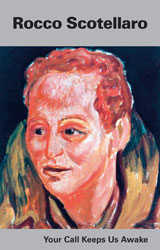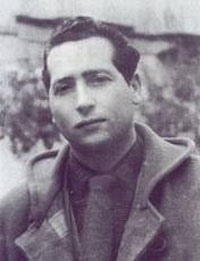Your Call Keeps Us Awake - OUT OF PRINT

Rocco Scotellaro (1923-53), the radical and unsentimental poet of Italian peasant life, grew up in the impoverished and mountainous Italian mezzogiorno. Active in the post-war struggle for land reform, his election as first socialist mayor of Tricarico brought him into conflict with local landowners. Imprisoned on false charges, he was eventually released but tragically died of a heart attack soon after. The following year, in 1954, Carlo Levi edited a posthumous selection of his friend's poetry, È Fatto Giorno, which was subsequently awarded the prestigious Viareggio and the Pellegrino prizes amongst others. In 1986 Mondadori published a complete collection of Scotellaro's poetry, from which this selection has been drawn and translated into English for the first time.
Scotellaro's work explores the ambiguous and painful tensions between family and individual, the country and the city, solitude and friendship; the contradictions of the old world, with the grandeur of its history and the backwardness of its superstitions, and the new world with its progress and its alienation. Your Call Keeps Us Awake provides a long overdue introduction to one of the pioneers of 1940s Italian neo-realism, a great poet and humanist of the twentieth century.
Cover image: Carlo Levi, Rittrato di Rocco Scotellaro (1961), reproduction by Vito Sacco. The private collection of Teresa and Filomena Mazzarone of Tricarico (Matera) whom we thank for their kind permission.
Sample Poems
(1) Il giardino dei poveri
È cresciuto il basilico nel giardino dei poveri: hanno rubata l’aria alle finestre su due tavole hanno seminato. Verranno i passeri, verranno le mosche, nel giardino dei poveri. Ora quando non sai che fare prendi la brocca in mano, io ti vedrò cresciuta tra le rose del giardino dei poveri. Potenza, 21 ottobre 1948
(1) The Garden of the Poor
The basil has grown in the garden of the poor: they have robbed the windows of air, sowed the seeds on two boards. The sparrows will come, the flies will come, in the garden of the poor. Now when you don’t know what to do pick up the pitcher in your hand, then I will see you grown among the roses in the garden of the poor. Potenza, 21 October 1948
(2) Mio padre
Mio padre misurava il piede destro vendeva le scarpe fatte da maestro nelle fiere piene di polvere. Tagliava con la roncella la suola come il pane una volta fece fuori le budella a un figlio di cane. Fu in una notte da non ricordare e quando gli si chiedeva di parlare faceva gli occhi piccoli a tutti. A mio fratello tirava i pesi addosso che non sapeva scrivere i reclami delle tasse. Aveva nelle maniche pronto sempre un trincetto tagliente era per la pancia dell’Agente. Mise lui la pulce nell’orecchio al suo compagno che fu arrestato perché un giorno disperato mandò all’ufficio il suo banchetto e sopra c’era un biglietto: ‘Occhi di buoi fatigate voi’. Allora non sperò più mio padre ciabattino con riso fragile e senza rossore rispondeva da un gradino ‘Sia sempre lodato’ a un monsignore. E si mise già stanco - dal largo mantello gli uscivano gli occhi - a posare sulla piazza, di fianco, a difesa degli uomini che stavano a crocchi. E morì – come volle – di subito, senza fare la pace col mondo. Quando avvertì l’attacco cercò la mano di mamma nel letto, gliela stritolava, e lei capì e si ritrasse. Era steso con la faccia stravolta, gli era rimasta nella gola la parola della rivolta. Poi dissero ch’era un brav’uomo, anche l’agente, e gli fecero frastuono. 1948
(2) My Father
My father would measure the right foot and sell shoes made by a master of the craft at fairs amid clouds of dust. With his cobbler’s knife he cut the sole like a loaf of bread and once spilled the guts of a son of a bitch. It was not a night to recall and when they wanted him to talk about it he would just scowl at them all. He threw the scales at my brother who never could write down the tax returns. He always kept up his sleeve a blade ready sharpened for the tax man’s paunch. It was he who planted doubt in the mind of his friend who got himself arrested when one day in despair he sent his bench to the tax office together with a note: ‘Now you, owl eyes, can wear yourself out.’ By then he had lost all hope, my shoemaker father. From one of the steps he replied to a monsignor, ‘May He always be praised,’ with a quiet laugh and without a blush. And already tired, his eyes peering over his ample cloak, he defended the men gathered in groups and stood on the square by their side. And he died – as he had wished to – suddenly, his peace still not made with the world. When he felt the attack he reached for mamma’s hand in the bed, he squeezed it, and she understood and pulled back. They stretched him out, his face distorted, words of revolt still in his throat. Then they said what a fine man he was, even the tax-man, and they made such a fuss. 1948
(3) Sera lontana
Batte già il mulo il ferro sopra il ciotolo mentre si assestano i guanciali nelle bisaccie. Si parte così nel Sud per le campagne la mattina, per la stazione rossa sull’arena del fiume, ogni anno mi parto anch’io. Io non so se posso per il mondo tenere il pugno chiuso nell’attesa di sgranarlo nel giuoco della morra, di tracannare oltre il desiderio e sentire la lama del coltello più calda della fetta rovesciata sul tavolo a boccone dei compagni. Di certo non potrò sentire i canti le nenie della mamma e le assonnate tiritere con zampogna e tamburino. E....La stazione non è già montagna. Tu non risali sull’imbrunire con frutti acerbi, paglia e fiasco vuoto non rivedi le quattro luci a segno di tutto il lungo borgo addormentato. Han perduto sapore, spaesato le tue parole. La tua terra, cara terra, che lì questa notte respira con grilli ridestati e le stelle, passa qui per un inutile inferno. Tricarico, settembre 1946
(3) Distant Evening
Already the mule’s iron hoof is striking the cobblestones as they fit their pillows into their saddlebags. This is how they leave for the countryside every morning in the South. I leave each year too, for the red station on the bank of the river. I don’t know if throughout my journey I can keep my fist clenched, waiting to open it for the game of morra, to drink to excess and to feel the blade of the knife hotter than the slice fallen on the table at a snack with friends. It’s certain that I will no longer hear the songs, my mother’s lullabies and drowsy rhymes played on the zampogna and tambourine. And….the station is no longer mountain. You don’t climb up at dusk with unripe fruit, straw and empty flask, nor do you see the four lights of the sleeping town. Away from home, your words have lost their flavour. Your land, your beloved land, breathing over there tonight with re-awakened crickets and the stars, is suffering here a useless hell. Tricarico, September 1946




